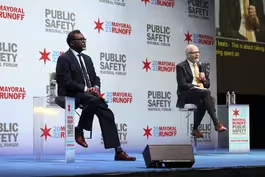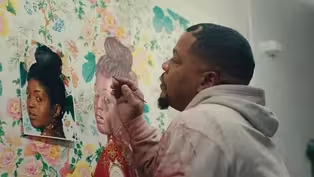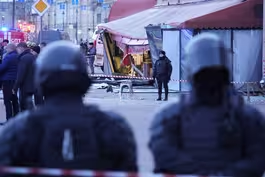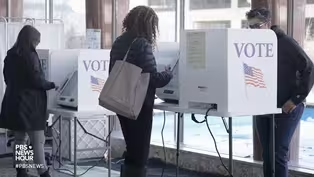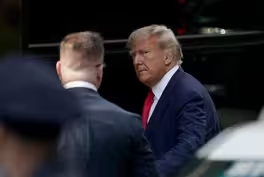
Former president of Iraq reflects on U.S. invasion
Clip: 4/3/2023 | 8m 38sVideo has Closed Captions
Former president of Iraq reflects on U.S. invasion 20 years later
Sunday will mark 20 years since American troops captured Baghdad after a swift and seemingly conclusive victory over Iraqi forces. But that victory was a mirage and years of terror remained for both Iraq and the U.S. before the establishment of a fragile democracy. Special correspondent Simona Foltyn spoke with former President Barham Saleh about his views 20 years later.
Problems playing video? | Closed Captioning Feedback
Problems playing video? | Closed Captioning Feedback
Major corporate funding for the PBS News Hour is provided by BDO, BNSF, Consumer Cellular, American Cruise Lines, and Raymond James. Funding for the PBS NewsHour Weekend is provided by...

Former president of Iraq reflects on U.S. invasion
Clip: 4/3/2023 | 8m 38sVideo has Closed Captions
Sunday will mark 20 years since American troops captured Baghdad after a swift and seemingly conclusive victory over Iraqi forces. But that victory was a mirage and years of terror remained for both Iraq and the U.S. before the establishment of a fragile democracy. Special correspondent Simona Foltyn spoke with former President Barham Saleh about his views 20 years later.
Problems playing video? | Closed Captioning Feedback
How to Watch PBS News Hour
PBS News Hour is available to stream on pbs.org and the free PBS App, available on iPhone, Apple TV, Android TV, Android smartphones, Amazon Fire TV, Amazon Fire Tablet, Roku, Samsung Smart TV, and Vizio.
Providing Support for PBS.org
Learn Moreabout PBS online sponsorshipAMNA NAWAZ: This coming Sunday will mark 20 years since American troops captured Baghdad, after a swift and seemingly conclusive victory over Iraqi forces.
But that victory was a mirage.
Years of blood and terror remained for both Iraq and the U.S. before the establishment of a fragile democracy.
Now special correspondent Simona Foltyn speaks with a leader within that democracy over these decades for his views 20 years later.
SIMONA FOLTYN: At his residence in Iraqi Kurdistan, we meet Dr. Barham Salih.
The Kurdish veteran politician served as Iraq's president from 2018 until 2022.
It was a tense period that shook the foundations of Iraq's post-2003 political order.
Large-scale anti-government protests called for sweeping reforms.
At the same time, the country risked turning into a battleground between U.S. forces and Iran-aligned actors as the two sides attacked each other on Iraqi soil.
I sat down with Salih to discuss the legacy of the U.S. invasion, the state of Iraq's democracy today and the country's importance for regional stability.
Dr. Barham Salih, thank you for speaking to the "PBS NewsHour."
BARHAM SALIH, Former Iraqi President (through translator): Thank you for having me.
SIMONA FOLTYN: Twenty years have passed since the United States invaded Iraq, based on false intelligence, but it did remove a brutal dictatorship.
From the Iraqi perspective today, was it the right thing to do?
BARHAM SALIH: For us, the issue was getting rid of Saddam Hussein.
Saddam Hussein was a brutal dictator, a tyranny that has really gripped this country, committed genocide against its own people, used chemical weapons and weapons of mass destruction to exterminate the Kurds.
Many, many other Iraqis in Southern Iraq and elsewhere have been committed to mass graves, a regime that has committed wars of aggression, a country that was under sanctions.
For us, war was not the best option.
We would have rather done it ourselves.
We would have rather been able to topple Saddam Hussein using our own means.
So, for us, the American-led intervention meant a great opportunity to get rid of this regime and allow the polity of Iraq to move on and hopefully develop a functioning democracy in the heart of the Islamic Middle East.
If you ask me and ask other Iraqis, and, no doubt, outsiders, well, we will all have to acknowledge this has not been achieved the way we hoped to.
SIMONA FOLTYN: One of the main challenges Iraq faces today is rampant corruption.
BARHAM SALIH: Yes.
SIMONA FOLTYN: Would you say this is a direct result of the political order the United States helped install?
And to what extent do you think the United States bears the responsibility, vs. the Iraqi elite?
BARHAM SALIH: I definitely agree with you that corruption is truly a problem.
Many mistakes happened in the process for administering Iraq's transition, of which the Americans can speak to their responsibility.
But, certainly, from our side, the idea of elections early on, and with a weak state, abundant resources, primarily revenues coming from oil and other resources that were easily accessed, has made corruption far more rampant.
And, today, if you ask me what is the number one priority for Iraq for it to survive, for it to be able to move forward, is to really tackle this issue of chronic corruption, which has become the political economy of the country.
Corruption allows armed groups, outlaw groups to be sustained, allows extremism to be sustained, allows conflict to be sustained.
The scale of the problem is very huge, partly because there is a lot of international complicity, allowing stolen assets to end up in the banking sectors of many countries.
So we need to get together to really take this on.
SIMONA FOLTYN: Many Iraqis today, including young people who never lived under Saddam, are once again yearning for a strongman.
It shows to some extent the disillusionment with this young democracy.
BARHAM SALIH: Sure.
SIMONA FOLTYN: Does that worry you?
BARHAM SALIH: Look, we have to acknowledge, in 2003, when Saddam Hussein was overthrown, the expectation, the hope, the wish was to see a functioning democracy that at the end would put Iraq at peace with itself and at peace with its neighbors.
And I'm not one of those who say everything was bad.
But, also, let us look at the context of things.
We have had changes of government six times, six prime ministers, four presidents.
And we're talking about the heart of the Islamic Middle East.
And what we saw in the protest movement in 2019, when young Iraqis from all regions of Iraq came out to the street demanding a change, demanding their homeland back, that was quite a profound statement about the liveliness of the society and the... SIMONA FOLTYN: But they failed.
BARHAM SALIH: Let me tell you something.
They changed the government.
They changed the elections law.
And I'm not saying that the protest movement delivered, no, but this is a polity that is happening back and forth.
There's a huge struggle.
This struggle over Iraq domestically matters.
It's amazing consequence for every community of this country.
It's amazing consequence to the entire neighborhood.
SIMONA FOLTYN: Saddam was a brutal dictator, but he was, to some extent, also a bulwark against external influence.
And, today, Iraq has become a battlefield of sorts for regional interests.
You have dozens of Turkish bases here in Iraqi Kurdistan.
You had just a few months ago the Iranian government shelling opposition groups.
And, of course, we all remember when the United States assassinated Iranian General Qasem Soleimani, as well as an Iraqi leader on Iraqi soil.
So what can be done to strengthen Iraq's sovereignty?
BARHAM SALIH: I will tell you something.
I challenge the premise of your question.
Saddam Hussein is the person, the leader who enabled foreign intervention in Iraq.
The agreement with the Turks by which the Turks are allowed to come inside Iraq was done under Saddam Hussein.
By the fact that he committed the crimes he committed against the Kurds, the Kurds were reliant on Iranian support and Syrian support and outside support in order to survive.
The same with Shia opposition groups.
So, basically, seriously, this notion that he was a bulwark, that's not... SIMONA FOLTYN: But you would agree there is more intervention in Iraq today than there was back then?
BARHAM SALIH: But, by the way, say -- let -- I'm not saying there are no and regional and international intervention.
Of course there is.
It's quite clear.
Nobody can deny this.
Turkish bases are too many in this country.
Yes, Iranian presence inside Iraq and its influence is real.
But I think you will be seeing more and more assertion of Iraqi sovereignty.
And I say to our neighbors, all our neighbors, including the Arabs, including the Iranians and the Turks, if they want Iraq to be viable and not a threat to you, state-to-state relations, a sovereign state to a state, because, otherwise, if you get too involved, this is a precursor for the intervention of others.
And this quagmire of Iraq, from their perspective, nobody gets out of it free.
SIMONA FOLTYN: U.S. policy on the Middle East is very much centered around Iran and American desire to reduce Iranian influence in the region.
Do you sometimes feel that Iraq is caught in the middle and that its interests are drowned out by geopolitical conflict?
BARHAM SALIH: Iraq -- Iraq is definitely caught in the middle.
Iraq is very much a key area for regional balances and dynamics, has always been, will always remain, is of consequence to everybody.
This place where everybody has viewed as a threat and that they had to dominate in order to prevent the others from dominating, let it turn it into a bridge.
We need partnership with the United States.
Iraq will always need good relations with its neighbors and certainly with Iran, but, at the end of the day, a state-to-state relationship, because, otherwise, if any regional actor dominates the others will be getting in.
And this, instead of being an opportunity for all, it becomes a quagmire for all.
This has been the history of the country.
SIMONA FOLTYN: Dr. Barham Salih, thank you very much for speaking to the "PBS NewsHour."
BARHAM SALIH: Thank you, Simona.
Chicago sees record early voter turnout in mayoral runoff
Video has Closed Captions
Clip: 4/3/2023 | 5m 27s | Chicago sees record early voter turnout in runoff election to pick next mayor (5m 27s)
Kehinde Wiley exhibit exposes violence against Black people
Video has Closed Captions
Clip: 4/3/2023 | 7m 39s | Kehinde Wiley exhibit uses historic icons to expose systemic violence against Black people (7m 39s)
Prominent Russian blogger killed in St. Petersburg bombing
Video has Closed Captions
Clip: 4/3/2023 | 8m 17s | Prominent Russian blogger assassinated in St. Petersburg bombing (8m 17s)
Sharp political divides shaped Wisconsin Supreme Court race
Video has Closed Captions
Clip: 4/3/2023 | 12m 54s | How Wisconsin's sharp political divides shaped state Supreme Court election (12m 54s)
Trump arrives in New York ahead of historic arraignment
Video has Closed Captions
Clip: 4/3/2023 | 4m 7s | Trump arrives in New York ahead of historic arraignment in hush-money case (4m 7s)
Providing Support for PBS.org
Learn Moreabout PBS online sponsorship
- News and Public Affairs

FRONTLINE is investigative journalism that questions, explains and changes our world.

- News and Public Affairs

Amanpour and Company features conversations with leaders and decision makers.












Support for PBS provided by:
Major corporate funding for the PBS News Hour is provided by BDO, BNSF, Consumer Cellular, American Cruise Lines, and Raymond James. Funding for the PBS NewsHour Weekend is provided by...
